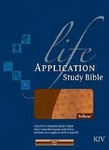As we continue profiling the Study Bibles from this month’s sale, today we will take an at-a-glance look at the Life Application Study Bible.
Title: Life Application Study Bible
Area of Focus: Practical Application of Scripture in Today’s Context
Contributors: Almost 100 contributors, including biblical scholars from multiple denominations.
Description: The Life Application Study Bible is similar to many Study Bibles in the way that it seeks to explain difficult passages. However, it then goes beyond this as it seeks to instruct and advise ways in which readers can apply these passages to modern life. Other features include book introductions, book themes, and profiles of biblical figures.
Sample Book Introduction from Judges
Real heroes are hard to find these days. Modern research and the media have made the foibles and weaknesses of our leaders very apparent; we search in vain for men and women to emulate. The music, movie, and sports industries produce a steady stream of “stars” who shoot to the top and then quickly fade from view. Judges is a book about heroes—12 men and women who delivered Israel from its oppressors. These judges were not perfect; in fact, they included an assassin, a sexually promiscuous man, and a person who broke all the laws of hospitality. But they were submissive to God, and God used them.
Judges is also a book about sin and its consequences. Like a minor cut or abrasion that becomes infected when left untreated, sin grows and soon poisons the whole body. The book of Joshua ends with the nation taking a stand for God, ready to experience all the blessings of the Promised Land. After settling in Canaan, however, the Israelites lost their spiritual commitment and motivation. When Joshua and the elders died, the nation experienced a leadership vacuum, leaving them without a strong central government. Instead of enjoying freedom and prosperity in the Promised Land, Israel entered the dark ages of her history.
Simply stated, the reason for this rapid decline was sin—individual and corporate. The first step away from God was incomplete obedience (1:11-2:5); the Israelites refused to eliminate the enemy completely from the land. This led to intermarriage and idolatry (2:6-3:7) and everyone doing “whatever seemed right” (17:6). Before long the Israelites became captives. Out of their desperation they begged God to rescue them. In faithfulness to his promise and out of his loving-kindness, God would raise up a judge to deliver his people, and for a time there would be peace. Then complacency and disobedience would set in, and the cycle would begin again.
The book of Judges spans a period of over 325 years, recording six successive periods of oppression and deliverance, and the careers of 12 deliverers. Their captors included the Mesopotamians, Moabites, Philistines, Canaanites, Midianites, and Ammonites. God used a variety of deliverers—from Othniel to Samson—to lead his people to freedom and true worship. God’s deliverance through the judges is a powerful demonstration of his love and mercy toward his people.
As you read the book of Judges, take a good look at these heroes from Jewish history. Note their dependence on God and obedience to his commands. Observe Israel’s repeated downward spiral into sin, refusing to learn from history and living only for the moment. But most of all, stand in awe of God’s mercy as he delivers his people over and over again.


